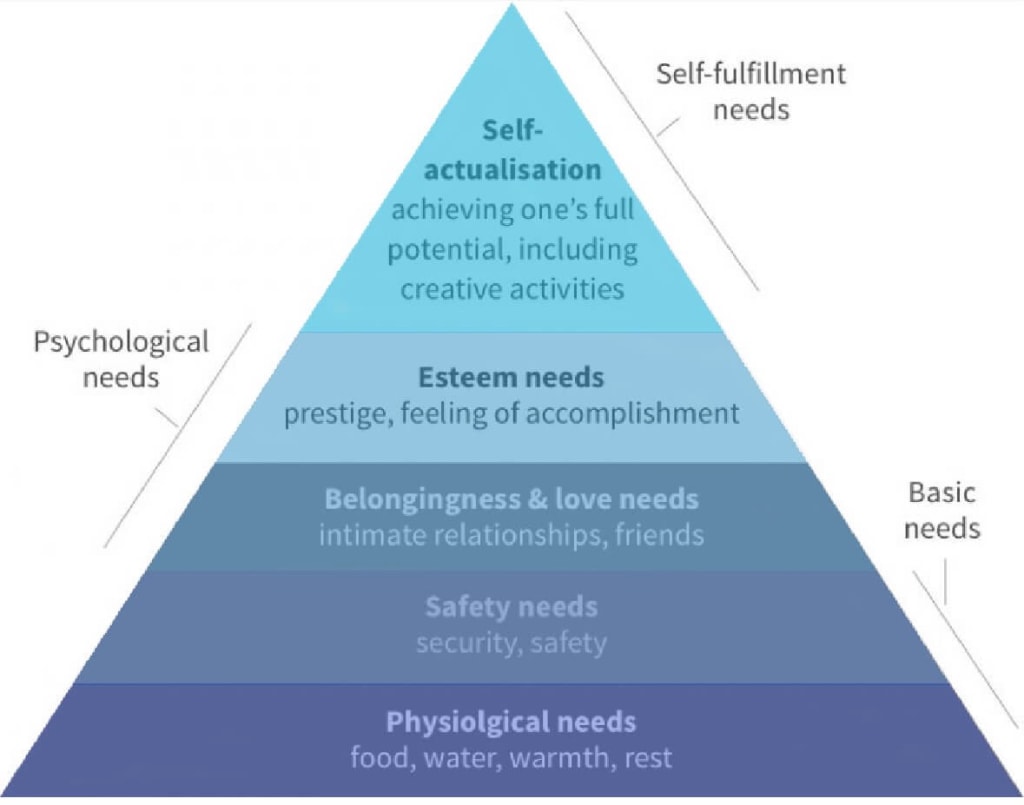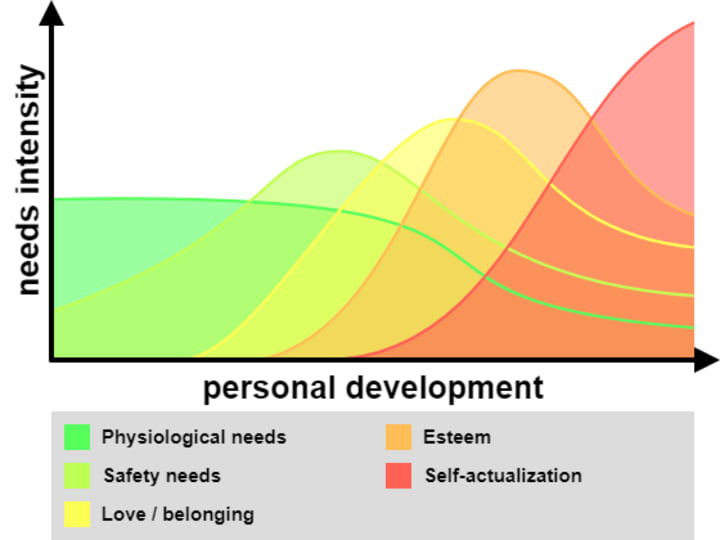Why You Need to Align Your Goals According to Maslow’s Hierarchy of Needs
And how to make your goals and habits stick

Keywords and ideas
Pyramid of Maslow → the underlying hierarchies need to be satisfied sufficiently (not completely) before one can move on to the higher hierarchies i.e. don’t neglect the lower hierarchies;
Aligning your goals according to the lower hierarchies → short-term and less motivation;
Aligning your goals according to the higher hierarchies → long-term and more motivation.
Abstract
In this article, I want to present how and why you want to align your goals according to the pyramid of Maslow.
Have you ever had a goal or wanted to build a habit, but gave up shortly after? Maybe you wanted to lose weight.
The pyramid of Maslow not only guides us and motivates us, but it also shows us why we sometimes give up rather quickly.
What is the pyramid of Maslow?
The pyramid of Maslow was invented by Abraham Maslow (hence its name), where he observed that humans have a (subconscious) desire to fulfill their basic needs first (e.g food and water) before moving on to other needs, such as the desire to create accomplishments (e.g. writing).
Recent research, however, have shown that the lower hierarchies don’t have to be satisfied completely for one to move on to the higher hierarchies (e.g. you can feel hungry yet you still want to write):

Image: By Philipp Guttmann — Own work, CC BY-SA 4.0, https://commons.wikimedia.org/w/index.php?curid=52306030
Why do you want to align your goals according to the pyramid of Maslow?
Aligning your goals to the lower hierarchies
Let’s imagine you want to lose weight. What are some possible reasons why you want to lose weight? Is it because you want to have a healthy body? Or do you want to be accepted by other people?
There’s nothing wrong with wanting to lose weight (in most cases), but I believe you are having the wrong reasons if you want to lose weight, because you want to be accepted by other people. Why? Because you will most likely give up within a short time.
Let’s take a look again at the pyramid of Maslow. If we want to lose weight, because we want to have a healthy body, that might belong to “physiological needs”, and possibly to “safety needs” too i.e. feeling safe in your body.
These reasons, however, aren’t that high up in the pyramid of Maslow. So what does that do? It causes you to give up rather quickly. Why? Because the goal isn’t big enough and even if it is, it’s not long-term enough.
Remember that image that shows how we have the desire to fulfill underlying hierarchies sufficiently before moving on to the higher hierarchies? You can imagine how, after having a healthy body, you quickly get back to your old eating routine, exactly because you fulfilled those basic needs i.e. “physiological” and possibly “safety needs”. Again, wanting to have a healthy body just isn’t long-term enough.
But how about wanting to have a healthy body, because you want to be accepted by others? Doesn’t that belong to a much higher hierarchy i.e. psychological needs such as “belongingness” and “esteem needs”?
Yes, it does probably belong to the psychological needs, but I believe that even that might not be high enough, and therefore, not long-term enough. And even if it is, you won’t become truly happy if everything that you do is because you want to be accepted by others. You need to love yourself too. You need to be intrinsically motivated.
Aligning your goals to the higher hierarchies
The only hierarchy we have left, then, is self-actualization (unless you include self-transcendence, which I will talk about later in another article).
First of all, what is self-actualization? Self-actualization means that you want to become the best version you can possibly be. When have you reached your best version? Never! There’s always room for improvement no matter how small they may be.
In other words, if you align your goals according to the hierarchy called “self-actualization”, you will have a very long-term goal. Why not never-ending? Because what you define as “your best version” might change over time.
So, let’s get back to that example of wanting to lose weight. How can we rearrange the words so that it belongs to the hierarchy “self-actualization”?
I want to lose weight, because I want to become the best version I can possibly be.
Now, that’s of course extremely simplified, because what is your definition of “best version?” Do you just want a fit body or do you also want to become as strong as possible?
Whatever it is, I do believe that aligning your goals as high as possible in the pyramid of Maslow, is better than aligning them to a lower hierarchy.
Don’t forget the lower hierarchies!
Yes, in order to motivate yourself to lose weight, aligning it with “self-actualization” is a good thing. The thing is, if your first purpose to lose weight was to be accepted by other people i.e. psychological needs, and no longer is “losing weight” attuned to that, what is?
Remember, in order to attune yourself and your goals to “self-actualization”, you first need to sufficiently satisfy the lower hierarchies. If you don’t do anything about those psychological needs i.e. feeling accepted, then it will be a hard thing to align your goal “losing weight” with “self-actualization”.
There are of course a lot of ways to satisfy those psychological needs, but I want to present a unique and philosophical way. Let’s review some quotes:
“The secret of happiness, you see, is not found in seeking more, but in developing the capacity to enjoy less” — Socrates
And:
“It is the privilege of the gods to want nothing, and of godlike men to want little.” — Diogenes of Sinope
Notice a trend? Exactly, less is more. In fact, if you are not careful, you will only chase for more and more. What does this do? Well, it leaves less and less room left for the higher hierarchies such as self-actualization. Why? Because you need to spend more time and energy to satisfy the lower hierarchies.
Look at people like Socrates, Diogenes of Sinope, and Gandhi, they were trying to fulfill self-actualization to the max!
A greedy person needs 10 different goals aligned to “psychological needs” before they can align 1 goal to self-actualization, whereas minimalists and asceticists only need 1 goal to be aligned to basic needs and psychological needs in order to align 10 goals to self-actualization. A huge difference! (Again, those are just random, metaphorical numbers).
Recap
By aligning your goals to a higher hierarchy, you are more motivated to continue in the short-term and long-term.
So if you want to lose weight, go to the gym, write everyday, you need to make sure whatever you do belongs to the hierarchy “self-actualization” while keeping the lower hierarchies satisfied.
Practice questions
What are some goals you have? To what hierarchy to they currently belong? And how can you bring them to a higher hierarchy?
In which hierarchy do you spend the most time and energy? And why?
What is your definition of “Your best self”? Or what is your life goal?






Comments
There are no comments for this story
Be the first to respond and start the conversation.